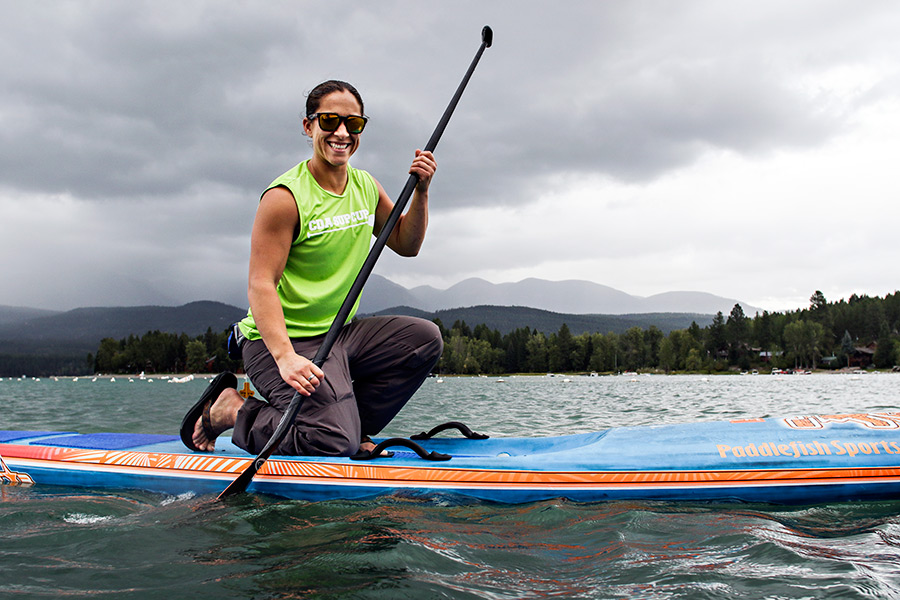Jonni Pekus peeled back the tape and gauze on her ankle to reveal a half-healed gash. “I’m proud of it,” she said. “It was bleeding hard, down to the bone.”
A month ago, Pekus, a robotics clinical coordinator at North Valley Hospital in Whitefish, fell off her paddleboard in a competition at Lake Coeur d’Alene, in Idaho, and slashed her skin open on the board’s fin. As her ankle gushed, she pulled herself out of the churning water onto the board and resumed paddling, maneuvering around a course of buoys. She took second. Then, due to her injury, she missed the next competition, a big one, the Double Downwind in Hood River, Oregon. It has prevented her from training as intensely as usual—five water practices a week plus constant dryland training—and on Saturday Sept. 12, she’ll race again at Round the Rock in Washington, one of the biggest competitions in the Northwest.
“No, [I’m not ready,]” she said, with a burst of laughter suggesting she’ll take the race head-on regardless. “It’s never enough [training.] I’m as ready as I’m going to be.”
Pekus first stepped on a paddleboard two years ago, after buying a big, heavy board from the Sportsman’s demo sale. She planned to strap on her camping gear and explore private beaches. Then her friends convinced her to participate in the Glacier Challenge, a race with six events, including paddleboarding and mountain biking legs. Pekus had been a professional mountain bike racer as a teenager, but after she sustained some head injuries and later a broken back in a logging accident at 19, she lost her sponsors and quit competing. Pekus’ team—2 Buoys and a Gull— took fourth place.
She did well in the paddleboard event, considering she was on a heavy board, carrying a heavy paddle, and wearing a life jacket three sizes too big. She started training every Wednesday with her friend Sonny Schierl, the owner of Paddlefish Sports in Whitefish, who had her try out different paddleboards—racing boards, fast boards. Less than a month later, he insisted she enter the Windermere SUP Cup, a race in Missoula.
“Paddleboarding is physical, but it’s mostly mental,” Schierl said. “She has the focus and commitment, and she’s just one of the happiest, most positive people I’ve ever met. That’s what’s going to make her go far in the sport.”
Pekus says she walked into the Missoula race “not knowing anything.” The other competitors were wearing spandex; she had on a bikini top. They all also wore shoes, which Pekus eventually learned was for the half mile run to the finish line. When she reached shore, she shrugged, and sprinted barefoot to the end. Pekus’ girlfriend, Theresa Aline, asked her how she’d finished so quickly, jokingly asking if she’d taken a cab.
Pekus won the elite division that day. She entered the next competition on the calendar, the race in Idaho where she got hurt. She attributes the injury to the fast current, the mobs of competitors storming around the buoy turns, and her inexperience.
She’s still green. But she is strong. As she sits by stormy City Beach in Whitefish talking before she paddles the lake’s length for practice, it’s clear her body would rather be moving. That’s how she’s been since she was a kid, the kind of active that gets you sent outside to play a lot. She exercises practically every day. Sometimes, she’ll go to Glacier High School to throw tires around with her friend John. Pekus says, “everybody’s always like, ‘what are you training for?’ I don’t know, life! But now I can say paddleboarding.”
Even with her strength, Round the Rock, a 13-mile sprint around Mercer Island, just off the Seattle coastline, will be a challenge. It’s a long haul, and Pekus is the type to sprint until she falls off her board from exhaustion. The water is bigger, and the currents will be trickier to navigate. With a $5,000 purse, the race also attracts a highly skilled field of competitors. Still, Coeur d’Alene was a technical course, and Pekus feels better suited for this race.
“I don’t have a lot of technique yet,” she said, ”but I’m all upper body strength and I am stubborn and I will paddle fast and straight as far as you want me to go.”
She’ll head up to Washington with Schierl and a team of local paddleboarders she has trained and raced with. Schierl, who anticipates seeing over 400 participants, is excited to see how Pekus will perform.
“I think she’s going to be so charged up… her focus and inner strength, that’s what’s going to make her do really well,” Schierl said. “And if she does, she’s probably going to have companies wanting her to ride their equipment.”
Pekus welcomes the prospect of competing professionally again.
“When I was racing downhill mountain bikes, it was like, ‘are you crazy enough to throw yourself off that?’ and lots of peer pressure,” Pekus said. “Paddleboarding is a healthy lifestyle. It’s my sport.”
